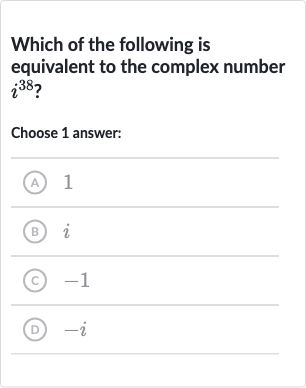Full solution
Q. Which of the following is equivalent to the complex number ?Choose answer:(A) (B) (C) (D)
- Step : Define as the imaginary unit: To solve for , we need to remember that is the imaginary unit, which is defined by . We can use the powers of to simplify because the powers of repeat in a cycle: , , , , and then back to . Let's find the remainder when is divided by , since the cycle repeats every powers. remainder
- Step : Simplify using the powers of : Since the remainder is , is equivalent to . We know that .
- Step : Find the remainder when is divided by : Therefore, is equivalent to .
More problems from Domain and range of quadratic functions: equations
QuestionGet tutor help

